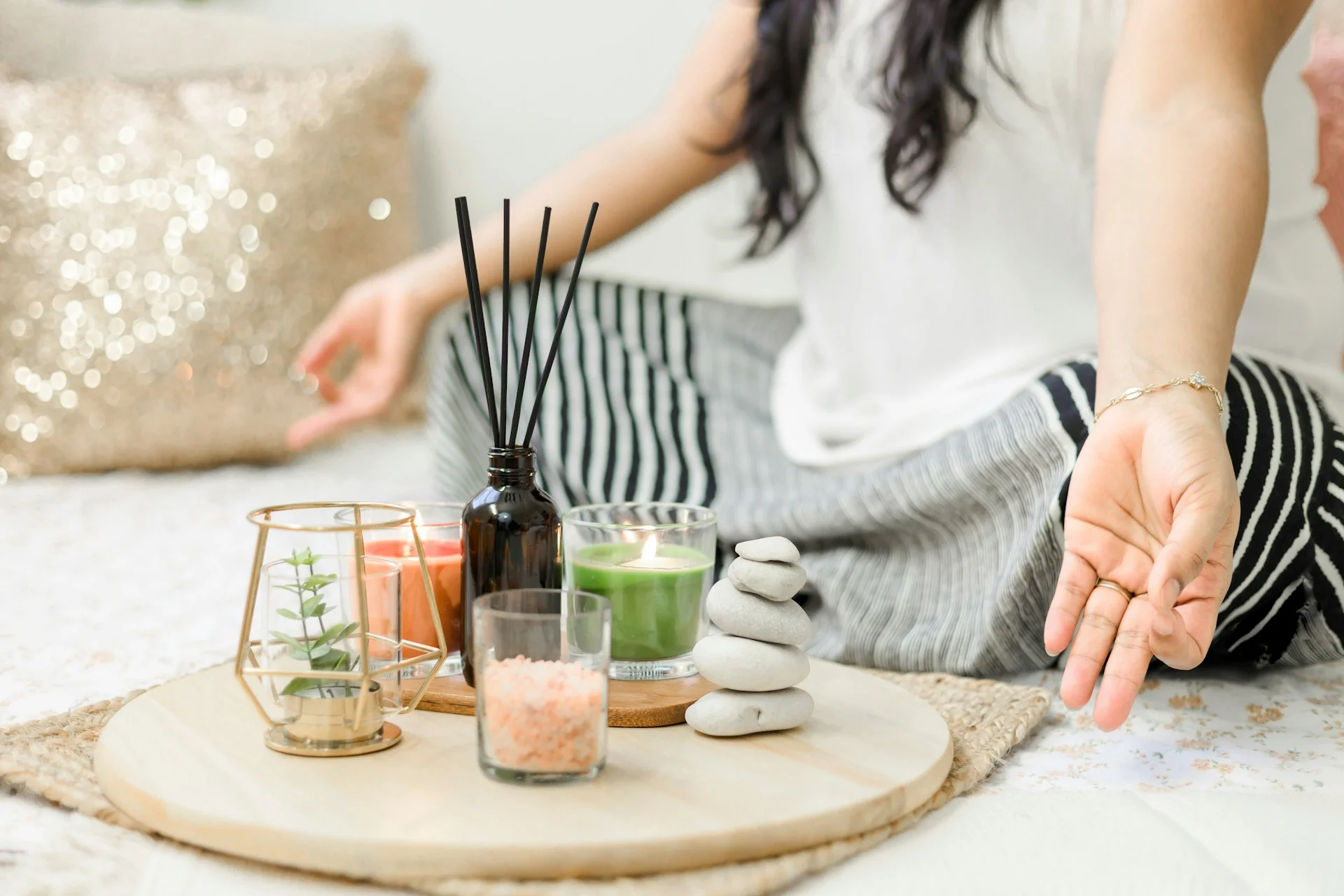
You’re drowning in endless to-do lists, racing against time while feeling completely off-balance. I can tell you that Western approaches to productivity often leave women more exhausted than fulfilled. But here’s what I’ve discovered: Japanese women have mastered something we’re desperately missing. They’ve cultivated centuries-old practices that create genuine harmony between ambition and peace, work and rest. These aren’t just trendy wellness tips—they’re proven pathways to the balanced life you’re craving, and they’ll transform how you approach each day.
Embrace Wabi-Sabi: Finding Beauty in Life’s Imperfections
The relentless pursuit of perfection has become modern women’s silent prison, and I can tell you from years of observing this pattern that it’s crushing spirits faster than any external pressure ever could. Wabi-sabi offers you a different path—one where cracked pottery becomes more valuable, where weathered wood tells stories, where your flaws become your greatest strengths.
I’ve never seen a woman truly flourish until she stops fighting her imperfections and starts celebrating them instead. Your messy desk isn’t failure, it’s creativity in motion. Your asymmetrical smile isn’t a flaw, it’s your signature. When you embrace wabi-sabi, you’re choosing power over perfection, authenticity over approval. This isn’t settling for less—it’s recognizing that your imperfections make you irreplaceable, unstoppable, and undeniably powerful.
True freedom emerges when you have the courage to be disliked for your authentic self rather than loved for a perfect facade you can never maintain.
Practice Shinrin-Yoku: The Healing Power of Forest Bathing

Your nervous system is screaming for relief, and I can tell you that no amount of spa treatments or meditation apps will give you what thirty minutes in a forest can deliver in one session. Shinrin-yoku literally means “forest bathing,” and it’s exactly what it sounds like – immersing yourself completely in nature’s environment.
I’ve watched high-powered women transform their stress levels by simply walking slowly through trees, breathing deeply, and touching bark with their bare hands. The Japanese discovered that trees release antimicrobial compounds called phytoncides, which boost your immune system and lower cortisol levels immediately.
You don’t need hiking boots or a mountain. Find any wooded area, leave your phone behind, and engage all five senses deliberately. This isn’t exercise – it’s medicine. To amplify the calming effects of your forest experience, consider diffusing balsam fir essential oil when you return home, as its woodsy properties can help recreate that peaceful forest atmosphere indoors.
Cultivate Ikigai: Discovering Your Life’s Purpose and Passion

While everyone else is chasing promotions and salary bumps, you’re probably sensing that hollow feeling in your chest that whispers “there has to be more than this.” Ikigai isn’t just another self-help concept – it’s the Japanese philosophy that sits at the intersection of what you love, what you’re good at, what the world needs, and what you can be paid for.
I can tell you that most women skip the hard work of actually mapping out these four circles. They’ll say they want purpose, then never sit down with a notebook to identify their genuine passions versus what they think they should love. Start by writing down activities that make you lose track of time. Then list your natural talents, the problems you’re uniquely positioned to solve, and realistic income streams. Your ikigai lives where these overlap.
This deep self-reflection pairs beautifully with developing a daily meditation practice, which reduces stress and improves focus as you navigate this journey of purpose discovery.
Master the Art of Mono No Aware: Appreciating Life’s Fleeting Moments
Finding your ikigai gives you direction, but without learning to appreciate the journey itself, you’ll still feel like you’re racing toward some finish line that keeps moving. Mono no aware teaches you to find power in accepting life’s temporary nature. I can tell you that women who master this concept stop wasting energy fighting inevitable changes and start drawing strength from them instead.
When your child outgrows their favorite toy, don’t rush to pack it away. Pause, acknowledge the bittersweet beauty of this moment passing.
When autumn leaves fall, notice how their brief display creates more impact than anything permanent could. I’ve never seen anyone regret taking time to witness these shifts. You’ll discover that embracing impermanence actually gives you more control, not less.
This practice of mindful observation mirrors how regular reflection helps you process life’s transitions with 20% better performance and significantly reduced stress.
Adopt Kaizen: Making Small, Continuous Improvements Daily

Perfectionism becomes your enemy when you’re trying to create lasting change in your life. Kaizen teaches you to embrace tiny, daily improvements instead of overwhelming yourself with massive transformations. I can tell you from experience, women who try to overhaul everything at once burn out within weeks.
Start with improvements so small they feel almost ridiculous. Want better health? Drink one extra glass of water daily. Seeking career advancement? Read five minutes of industry content each morning. I’ve never seen anyone fail when they commit to changes this manageable.
The power lies in consistency, not intensity. Each micro-improvement builds momentum, creating compound results over months. Your brain won’t resist these gentle shifts, making long-term success inevitable. Small steps lead to significant transformations. Remember that habit stacking can amplify your progress by linking these new micro-improvements to routines you already perform automatically.
Create Sacred Spaces With Ma: the Japanese Art of Meaningful Emptiness
Small improvements work beautifully when you have the mental space to implement them, but most women I know live in cluttered chaos that blocks their ability to think clearly. Ma changes everything. This Japanese principle teaches you to embrace intentional emptiness, creating breathing room in your physical and mental environment.
I can tell you that clearing just one surface in your home creates immediate mental relief. Start with your nightstand, remove everything except one meaningful object. Feel that spaciousness.
Now apply ma to your schedule by leaving fifteen-minute gaps between appointments.
I’ve never seen a powerful woman who couldn’t think clearly in her own space. Ma isn’t about minimalism for aesthetics, it’s about creating sacred emptiness that allows your mind to expand, process, and generate the brilliant ideas you need. When you embrace this philosophy in your workspace, even stylish desk organizers that reflect your personality while maintaining intentional emptiness can transform your ability to focus and create.
Practice Mindful Tea Ceremonies for Daily Reflection
When you create sacred mental space through ma, you need a ritual that transforms this emptiness into clarity, and the Japanese tea ceremony gives you exactly that framework. I can tell you that incorporating even a simplified version into your daily routine creates profound shifts in your decision-making power.
You don’t need elaborate equipment. Start with quality tea, a simple cup, and five focused minutes. I’ve never seen anything match the clarity that comes from this deliberate slowness – measuring tea, heating water to the right temperature, pouring with intention. Each movement becomes meditation.
The key is treating this as serious business, not casual tea drinking. You’re training your mind to slow down, observe details, and make conscious choices. This ritual builds the mental discipline that translates directly into better leadership. Like the traditional practice of zazen meditation, this mindful tea ceremony teaches you to return your wandering thoughts to the present moment, creating the same increased focus and stress reduction that comes from counting breaths.
Embrace Omotenashi: The Spirit of Selfless Hospitality
True power lies in serving others before yourself, and omotenashi gives you the Japanese blueprint for leadership through selfless hospitality. I can tell you that women who master this practice don’t just gain respect—they command it through authentic service.
True leadership emerges when you serve others first—omotenashi transforms selfless hospitality into commanding, authentic influence that demands respect.
You’ll transform every interaction when you anticipate needs before they’re voiced. I’ve never seen anything create stronger loyalty than making others feel genuinely valued through thoughtful attention.
Notice what someone needs before they ask, like refilling their water glass during meetings. Recall personal details from previous conversations to show you truly listened. Create seamless experiences by handling problems behind the scenes. Offer help without expecting recognition or immediate reciprocation. Maintain grace and composure even when serving difficult people.
Building these support networks through genuine service creates the foundation for long-term success, as you’ll find that those you’ve helped will naturally become your strongest advocates and allies.
This isn’t weakness—it’s strategic influence through genuine care.
Develop Gaman: Building Resilience Through Patient Endurance

Although modern life pressures you to seek instant solutions, gaman teaches you that real strength comes from patient endurance through difficulty. I can tell you from experience, this Japanese principle transforms how you handle setbacks, disappointments, and overwhelming challenges.
When you practice gaman, you’re not passively accepting defeat. You’re actively choosing to persist through hardship without complaint, building unshakeable inner resilience. I’ve seen women who master this approach become unstoppable forces in their careers and relationships.
Start small: when traffic delays your commute, resist the urge to rage. When a project faces unexpected obstacles, breathe deeply and adapt your strategy. Each moment of patient endurance strengthens your capacity to weather bigger storms. Gaman doesn’t mean suffering silently, it means developing the emotional fortitude to outlast temporary difficulties.
Remember that 90% of worst-case scenarios never actually happen, so gaman helps you endure present challenges without catastrophizing about imagined future disasters.
Honor Seasonal Living With the Concept of Seasonality
Building inner strength through gaman creates the perfect foundation for embracing another powerful Japanese principle that will revolutionize how you approach your daily life. Seasonality, or *kisetsukan*, teaches you to align your energy with nature’s rhythms instead of fighting against them. I can tell you from experience, women who master this concept stop burning out because they’re working with natural cycles, not against them.
Japanese women have practiced seasonal living for centuries, and I’ve never seen anything more effective for sustainable balance:
- Eat seasonal foods – Spring greens for detox, summer fruits for energy, autumn roots for grounding, winter soups for warmth
- Adjust your sleep patterns – Earlier bedtimes in winter, later in summer
- Rotate your wardrobe completely with each season
- Plan intense projects during your high-energy seasons
- Schedule rest periods during natural low-energy times
Transform your autumn wellness routine by embracing seasonal produce like pumpkins and butternut squash, which are naturally rich in immune-boosting vitamins A and C.
Practice Zazen: Sitting Meditation for Mental Clarity
When you combine seasonal awareness with the mental discipline of zazen meditation, you’ll discover what I consider the most transformative practice in Japanese culture for achieving lasting inner peace. Zazen literally means “seated meditation,” and I can tell you it’s nothing like the complicated mindfulness apps cluttering your phone.
You sit upright, breathe naturally, and observe your thoughts without judgment. That’s it. No mantras, no visualization, just pure awareness. I’ve never seen anything strip away mental chaos faster than twenty minutes of daily zazen practice.
The power lies in its simplicity. When overwhelming decisions flood your mind, zazen teaches you to watch them pass like clouds. You’ll develop unshakeable focus, making complex choices with clarity that surprises everyone around you.
Cultivate Gratitude Through Daily Appreciation Rituals
This mental clarity you’ve gained from zazen creates the perfect foundation for Japan’s most underrated wellness practice: structured gratitude rituals that go far beyond writing three things in a journal before bed.
I can tell you from experience, Japanese women don’t just think gratitude—they embody it through intentional daily practices that rewire your brain for abundance thinking. These aren’t feel-good exercises; they’re strategic mental conditioning for women who refuse to settle.
- Morning tea ceremonies where you acknowledge each sip’s warmth and your body’s ability to receive nourishment
- Evening reflection walks through your neighborhood, mentally thanking three people who supported your day
- Gratitude bowing toward your workspace before leaving, honoring the opportunities it provides
- Seasonal appreciation moments noticing cherry blossoms, autumn leaves, or winter’s stillness
- Thank-you notes written by hand to yourself, celebrating small wins
Master the Art of Decluttering With Minimalist Principles

How often do you look around your home and feel overwhelmed by the sheer volume of stuff surrounding you? I can tell you that mastering Japanese minimalism isn’t about deprivation—it’s about power through intentional living.
Start with the KonMari method: hold each item, ask if it sparks joy. If it doesn’t serve your current life, release it. I’ve never seen a woman regret clearing visual clutter from her sanctuary.
Focus on one category at a time—clothes first, then books, papers, miscellaneous items, and finally sentimental pieces. Create designated homes for everything you keep. When you eliminate excess, you eliminate decision fatigue. You’ll spend less time managing possessions, more time pursuing what matters. Clean spaces create mental clarity, helping you think strategically about your goals.
Balance Work and Rest With the Rhythm of Nature
Your body already knows when it’s primed for deep work versus restoration. I’ve never seen a woman maintain true power by burning herself out against her natural rhythms.
- Morning clarity: Tackle your most demanding decisions between 6-10 AM when cortisol peaks naturally
- Afternoon dip: Use 1-3 PM for routine tasks, not strategic thinking
- Evening wind-down: Stop screen work 90 minutes before intended sleep
- Seasonal adjustments: Reduce evening commitments during winter months
- Weekly rhythm: Designate one full day for complete mental rest
Conclusion
You’ve got everything you need to transform your daily life through these powerful Japanese practices. I can tell you from experience, the women who commit to even three or four of these habits see remarkable changes within weeks. Start small, stay consistent, and don’t expect perfection. Your journey toward balance isn’t about doing everything flawlessly—it’s about showing up for yourself every single day with intention and grace.





Leave a Reply